On March31, 2018 I and other coffee farmers travelled to Buzami Village, Bunjakko Island in Buwama Sub-county, Mpigi District to learn about a new method of increasing coffee production and output.
As you approach the one–acre coffee demonstration farm set up by Joseph Nkandu, a prominent farmer and Executive Director at National Union of Coffee Agribusinesses and Farm Enterprises (Nucafe), you’re welcomed by soothing breeze and beautiful sounds from Lake Victoria.
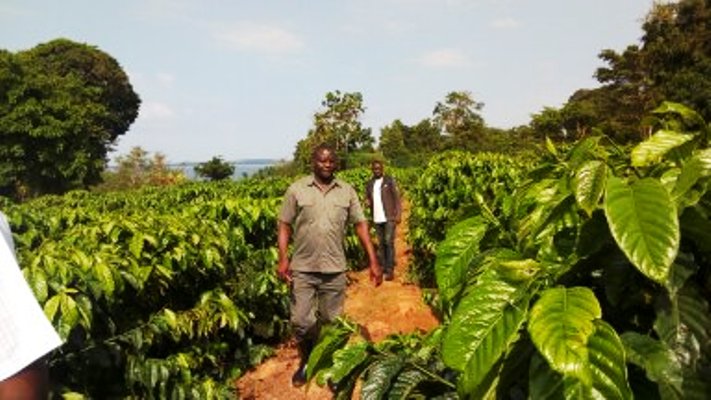
But what is more fascinating is the coffee itself; the coffee trees look too squeezed so much that an ordinary farmer would imagine that the person who planted it doesn’t know what he was doing.
However, as Nkandu started the training, his enthusiastic guests begun to appreciate why they should adopt the new coffee planting method he copied from Brazil, the world’s leading coffee producer, at 55 million 60-kg bags annually.
During his visit to the South American country a few years ago, Nkandu realized that they had more coffee trees in an acre than Uganda. He replicated this method at his farm and is already earning handsomely.
Spacing
Uganda Coffee Development Authority (UCDA) has always advised farmers to plant 450 trees of Robusta coffee in an acre at the spacing of three metres by three metres.
However, Nkandu says the Brazilian spacing is the way to go because it maximizes land and labour. Under this new method, coffee trees are planted at spacing of one metre apart and the rows are three meters apart, implying that a farmer can have 1,300 Robusta coffee trees in an acre.
He advises that holes 2X2 feet (deep and width) are dug a month earlier before planting. He adds that a farmer should apply a full basin of manure (this can be cow dung, poultry droppings mixed with soil or composite manure) per hole before planting the seedlings.
Planting should be carried out at the onset of rains. He says after planting he applies 20 grams of Single Super Phosphate around the plant to boost the rooting system.
“You can have three acres of traditional spacing in one acre using the Brazilian model,” Nkandu said, adding: “Population is increasing but land remains fixed. We have many smallholder farmers which call for land maximization to increase productivity.”
He added that labour used on the 450 coffee trees of traditional spacing is the same labour required for 1,300 coffee trees under the Brazilian model.
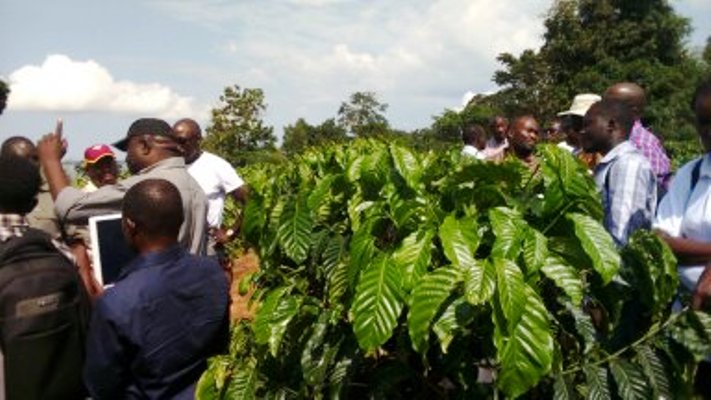
Nkandu’s demonstration farm on the shores of Lake Victoria is slightly over two years old.
He revealed that he only plants clonal Robusta coffee against Robusta Elite that is being supplied to farmers by the government under UCDA in collaboration with National Agricultural Advisory Services (NAADS) and Operation Wealth Creation (OWC).
The word clonal means that the coffee plants have been multiplied asexually from a single parent plant or clone.
Unlike Robusta Elite seedlings that can be bought at Shs300, clonal Robusta seedlings go for an average of Shs1, 500.
He says clonal coffee is fast maturing, high yielding and resistant to diseases compared to Robusta Elite. At 10 months, clonal Robusta coffee starts flowering, implying that by one and half years, a farmer would start earning from his coffee plantation.
“With best agronomic practices, you can’t go wrong with coffee,” he said, assuring the group of farmers why coffee farming is worth it.
He adds that after three months, coffee should be bent towards East-West so as to develop more branches. A farmer is advised to leave 3-4 branches per tree. These branches help in increasing production and output.
Soil Testing Important
Nkandu says he carried out soil testing to help him ascertain nutrient composition, hence establish missing soil requirements.
He encourages farmers to do the same as this will increase their yields.
“If you realize there is lower soil PH, you can raise it,” he says, adding that coffee farming is a science throughout the value chain.”
Soil testing can be done at Makerere University.
Because of poor soils at his farm, Nkandu said that after five months of planting, he applies nitrogen rich nutrients while managing weeds very well as well as pests and diseases.
After harvesting, it’s advisable to take another soil nutrient analysis.
Irrigation
Water is very important for coffee farmers to earn big.
During the dry spell, Nkandu pumps water from Lake Victoria into the coffee trees using a ‘rain gun’.
Irrigation makes sure that the coffee trees have sufficient water all the time, hence high yields. He noted that coffee needs a lot of water during the flowering stage.
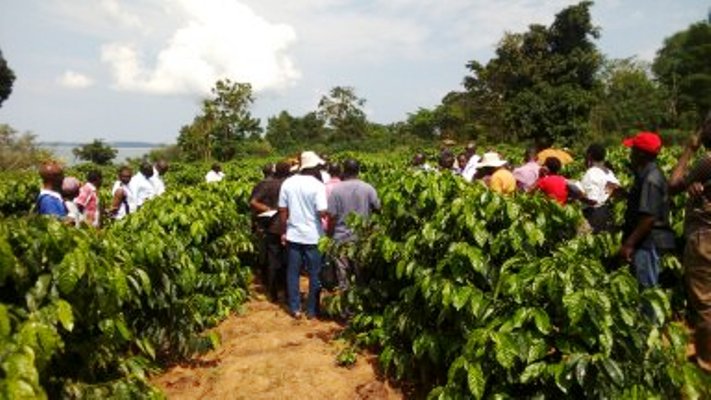
Stamping
He reveals that after 7/8 years, it’s advisable to stamp/cut the trees. Stamping is done at about 45 degrees using a saw so as to avoid the stems rotting. Stamping is done to allow new development of branches and maintain higher yields as older trees tend to experience low yields.
He advises farmers to leave at least one branch for cash flow purposes.
Harvesting
Nkandu revealed that he was able to get 2.2kgs of graded coffee in green form in his first harvest. He however, says that in the coming years, he’s optimistic he will get as high as three tons of graded coffee in an acre. The average price of a kilogram of quality graded coffee is about US$1.7 (about Shs6, 000).
Deus Nuwagaba, the Deputy Executive Director, Operations Management at NUCAFE added that without exaggerating figures, a farmer can earn as high as Shs23.4m annually from an acre of coffee with the modern way of spacing.
He says it is very possible to get 1.5kgs of green graded coffee per tree. Considering the 1,300 trees in an acre, a farmer will be able to get 1,950 kgs. Taking an average price of Shs6, 000, a farmer is able to earn Shs11.7m in a single season.
He reveals that there are two seasons in a coffee calendar year, implying that a farmer is able to earn a gross profit of Shs23.4m annually.
Advice to farmers
Nkandu advises farmers not to sell their coffee through middlemen. He says NUCAFE promotes the farmer-ownership model whereby a farmer owns the coffee throughout the coffee value chain.
“Don’t sell coffee when it’s on trees; you don’t know what you’re selling,” he says, adding: “A farmer should at least lose ownership at the graded coffee.”
He also advises farmers to train their workers on the best agronomic practices not only to increase productivity, but also improve on the quality of Uganda’s coffee.
Nkandu’s demonstration farm is surrounded by trees which he says is good for biodiversity.
“As a farmer, you need bees. I don’t have shade trees so the trees in the boundary are very important for the farm survival,” he says.
Asked about the availability of the market in future considering the fact that government is looking at producing 20m-60kg bags of coffee by 2025, in addition to mega plans by other countries to up production, Nkandu, said he has been involved in the coffee business for a long time and he sees the market of quality coffee guaranteed.
Big numbers
Currently, Uganda produces about four million 60-kilogramme-bags of coffee annually while Brazil which leads the world produces between 55 and 60 sixty-kilogramme-bags annually.
Nkandu says if Uganda increases the coffee tree numbers per acre from 450 to 1,300 in addition to using fertilizers, coffee production and output would jump.
Coffee is Uganda’s third foreign exchange earner after tourism and remittances.
Going forward, players like Nkandu are hopeful that the crop will reclaim its number one spot of bringing in foreign exchange once farmers are sensitized about the Brazilian method of farming, in addition to using irrigation farming in times of limited rains.
For quality Clonal Coffee Planting materials and consultancy, contact me via 0775170346/staddewo@gmail.com




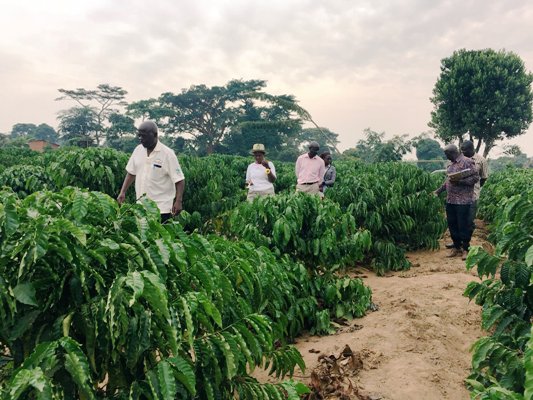

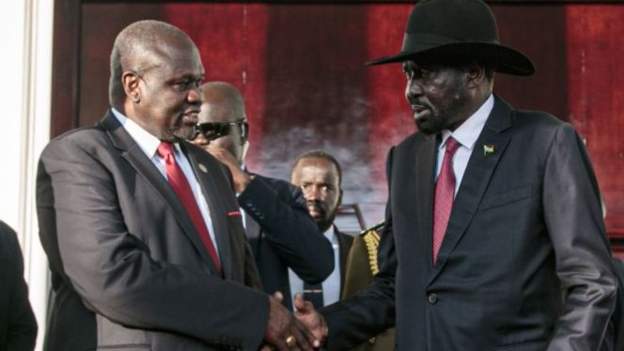
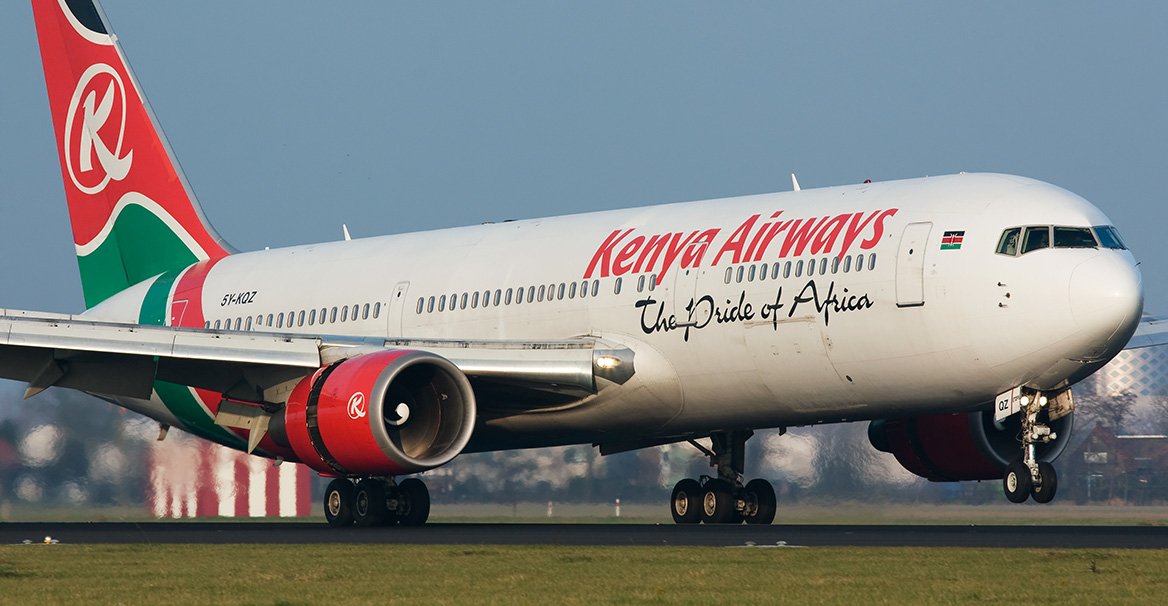
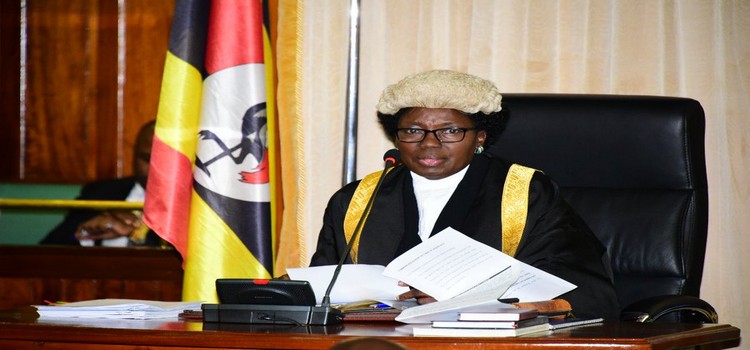
Thank you so much.
I also need a coffee expert on establishing a nursery of about 40,000 trees
Very educative and encouraging info.
Getting in to coffee growing soon.
I am in kiryandongo, where can i get quality seedlings for planting and at what ost?
Hello Benjamin. Reach out via 0775170346/0703828741.
Thanks for the great information it has rely impacted on my effort to
Produce more.
Hello,
I am thinking about starting this business. I am looking for someone who already into the business. I would like to talk to you more about it.
thank you!
‘Clement’
This information is really educating and is going to improve our plantations , thank you . What type of coffee can be planted in western uganda like in kikuube and how much I a seedling of clonal coffee
Robusta. Each plantlet is 1500
Good idea
I started the Brazilian style at two acres in kiboga, but I am interested in controlling weeds around the coffee stems. I remember apost about a method of doing it. Can someone help.
hello,
Thank you for the knowledge please may i know how what reacquires to make visit or Programmed for Visitor of the Farm so that I can learn more from the Ground since this is practical work.
whatsp:+971522900451
Very insightful and educative .
Thank you so much.
I intend plant coffee in Iganga and Kamuli
Where is the nearest source of clonal Robuster seedling for people in Iganga/Kamuli.
How much is soil testing at makerere University?
Reach out to me via 0775170346/0703828741
It’s now 2023 when I have got this knowledge thank you for keeping the information, I’m going to try this system on my 3 and ahalf acres of land
i have read all through all your coffee farming methods.that’s good to follow.
thank you so much for that piece.
hope to organize and visit your farm as family members.
Nelson from Bunyaruguru.
Thanks for the great advice banange
I want someone to do the planting and maintenance for my new 4 acreas using this new model of 1300 trees per acrea. Please send me an email before Monday 21st Feb 2022
staddewo@gmail.com/0775170346
Thanks very for the coffee information I have in hoima am going to clear it after clearing it advise on the stages to follow
Thank
Gudevng
Did u mange to plant coffee
extremely educational thank you very much i am from sri lanka i will really go in for coffee planting in my land thank you once again for the excellent sharing of valuable knowledge
It’s avery productive idea but farmers needs to be educated first but I believe those able can try it out
Very impressive innovations, thank you 4 sharing with us
I got interested in coffee farming..I have 8acres of land in MASINDI .I would like to get contacts from clonal robuster coffee seedlings..I appreciate
Contact me via 0775170346/0703828741
This is impressive to read. How do i get that breed of coffee here in hoima. i want to start planting
it the coming season. (march/April). Please contact me on 0786915382. I
Get in touch via 0775170346
Aprospective coffee farmer in the far East of Busia county in Kenya,how about cloned seedlings and the market? Thanks.
Thanks for the eye opening to our dear farmers Mr senyonyi. I will WhatsApp you for more information.
Am so impressed with his teaching but some area of ug were coffee is grown we no machines gran coffee that y we seal to middle men sir
We call apone gvt of ug to set organisation wich will support small scale farmer to come up .by giving us grants .fertilizers herbicide s . insecticides so that we promote quality of coffee in ug
its true u can get that amount of money , i started a farm like that four years back
Thanks I’m soon planting this coming season,and I am to use that spacing demonstration,and I am optimistic it work.thanks a lot.
Hello @Mr Mickey Lazar
I am planning to start coffee growing in Uganda in Kapeeka and
I would also love to know more about the Israel Technology
My whats app number is +256702 429 934
I have a type of coffee grown mainly in west Nile I need help whether its either clonal or robust a coffee.0759191873
Thanks Mr Nkandu for the great wisdom shared. I am very much inspired. Let me adjust the UCDA spacing I had followed.
Thanx 4 da innovation plz..naye i wud lyk to no more about “FERTILIZER APPLICATION” At the top dressing stage in 3-5yrz.
Thanks alot for that information
I’m looking forward to applying fertilizers in my one acre coffee plantation that I have just acquired.
Thanks for that new model. I have 1.5 acres of land and am beginning the project soon. May you please guide on spacing.
Get in touch 0775170346/0703828741
Get in touch with me via 0775170346/0703828741
Am planning to plant one acre of coffee in kiwoko Nakaseke ,how can I get good seedlings.thank for good advice
Get in touch with me via 0775170346/0703828741
Thanks for sharing knowledge with us, I have also learn new ways of planting
Thank you so much. I have just acquired some land in mayuge. i would like to start up a commercial coffee farm. please give me some advise. plus how long does coffee take to mature. how long will i take to start earnimg from it
Have land in Mayuge. Can I get in touch with Alice Musibika for closer collaboration
Thanks alot may I have your number,in need of the seedlings
How about fertilizers after some time?
Thanks for the contribution
I want to start coffee farmingintrested in clonal any insight
Get in touch via staddewo@gmail.com
Thank you so very much Mr.Nkandu for you have contributed a lot to the development of agriculture and coffee in particular. Am a coffee farmer in Mityana on a small scale but am real proud of your contribution to this nation. Keep up the spirit and God bless the works of your hands. I saluti you for the nucafe Roast & Ground Coffee its real good am your customer and i real feel good when i buy it coz am giving back to my teacher and a fellow country man
Very good innovation… I also started growing coffee in different parts of the country and I have a total of 10acres with different periods of planting …
Am encouraged to see such a motivation .
Thank you
I want more seedlings 50000 of cloned robusta coffee please your contact
Call me via 0775170346
I’m a coffee mother garden operator certified by the Uganda Coffee Development Authority, I have ready and mature coffee seedlings for sale and also I provide free knowledge on the 3m×1m system of planting coffee as showen by mr Nkandu. For the best clonal coffee seedlings ranging from Kr 1 to Kr 7, contact us on 0757194167 (Reagan) or 0756712518 (Stephen)
I appreciate your technical advice. I pruned at the beginning of the year and now the new shoots are blossoming,what can I do to ensure stability in growth? Please advise me.
Hello Mickey Lazar,
I’m a prospective 1st time coffee grower in a region not yet known for coffee.
I’m really interested in the Israeli technology you’ve talked about.
Please give me more information.
Joseph
Hello Danson Mutungi,
i can help you about that; please email me to afilap@gmail.com
in addition, i can assist you with Israeli technology to avoid weeds around the tree trunk (NO HERBICIDE!!), get same results with only 50% fertilization.
the technology reduces the water needed for irrigation by 50%.
if you do not have a water source near your land, an Affordable Rain Water Harvesting system can collect enough water to allow you very smart irrigation, thus allowing you to irrigate your coffee plantations during dry seasons.
Hello Mickey Lazar,
I’m a prospective 1st time coffee grower in a region not yet known for coffee.
I’m really interested in the Israeli technology you’ve talked about.
Please give me more information.
Joseph
I would like you to share your telephone especially the one with WhatsApp. This contact will help in communication
HOW CAN I GET TO NKANDU’S FARM
Hi guys
I am from Kenya and I am happy to see Ugandan way of farming coffee.Us we plant arabican coffee.
GOOD METHODOLOGY AND GOOD AT COST CUTTING
Nkandu’s method of 1,300 plants per acre are wealth creation.
I m planing to start coffee farming on 250 acers in Uganda, I wanted to know the expenditure average on coffee through out year. My personal cell no and whtsapp no +91-9876226003
Please write me back.
Hullo was impressed with this project of 1300 seedlings on an acher. But would like to know where can one buy good quality of colonal robuster coffee in uganda
It was a nice experience and now I would like to know the source of the seedlings.
am requesting for aproper direction to mr nkadu’s farm and if at all there is a cost, the cost in order to visit his coffee farm.
I appreciates your good advise thanks so much otherwise kindly Mr. Nkandu your namba boss.Am preparing to plant coffee yield three acres in Iganga district but am looking for seedlings. Thanks.
Thanks a lot for the new coffee growing insights you have given here. am a bit disturbed about the amount of irrigation water needed for a plant in addition, can there be an irrigation schedule tailored to the our seasons here. i mean when a farmer can irrigate and what amount. i think u having seen how the Brazilians do it, we can also come up with such a schedule here.
Am impressed by the new coffee and its methods. Am planing to start planting bit how do I get these good and new crops, how much will it cost me for an acre to the time of harvesting. Please contact me 0703637139. I need clonal robust now.
Hello Charles,
Fatinah here. I read that you wanted to plant robuster clonal coffee but you needed plantlets. Well, I have good ones and in case you haven’t got please contact me on 0772459126/0703850091.
Am accredited by UCDA as a nursery operator and my prices are good.
Find me at nkoowe, I wakiso district, 30metres off the main Hoima road.
Regards.
Which is the best fertilizer and which shop sells the original things for agriculture
When is the next visit to Nkaddu’s farm?
Can I get his contact (mobile number)
Otherwise it was good literature. By God’s will I’ll take a lesson from this.
Thank you Mr Kandi
Thank you very much I was rushing to plant this season because government has promised me 2000 seedlings free but now I have learnt the reason. Now where can I get the good clonal robust a coffee from so that I start next year. WhatsApp no is 0753977873
Email me: staddewo@gmail.com or call: 0775170346 (also on WhatsApp)
Can I please get Mr. Nkandu’s cel, phone number?
I have 23 acres of land, could nucafe give me some advice or consultation on how to grow coffee same as this brazilian style?
One time i went to gomba district and found one coffee farmer who planted some banana in his coffee plantation and the plantation was looking very good and he claimed that bananas helps to generate shelter and keep the soil moist for the coffee trees to be healthy, can this work and be more productive without affecting the quantity of coffee harvest
Anything about improving my Arabic coffee farm in Zumbo district uganda
It’s really amazing to learn the new method,am a coffee farmer from fort portal Uganda having a farm of about 4-7 htrs but lacking knowledge on good methods of coffee growing I used the 450 plants @ htr my first havest was 98kgs and would really love to visit one of your farms thanks
Get in touch with me via staddewo@gmail.com/0775170346
Am byamukama John coffee farmer in fort Portal _kabende subcouty with 2htr of coffee plantation with 600 coffee trees my first I got 40kg I would like learn new model of coffee and join demonstration form for more knowledge thnx
For real I still need to understand more any that new method
Good massage sir,I have got the message Very clearly.thank you
Thank you for opening my mind to know how to earn such amout of money on just 1acre of land cant you reduce for me that price from 1500 to1000 since iwant to plant 20 acres
Astudent at kyambogo University having an acre of land planning to plant coffee .I thank u for the advise but jst request u to be my mentor and adviser . I request we be in touch sir
Get in touch via 0775170346
Hello William.
Greetings! What is the approximate amount of money that an acre in Ntuusi Ssembabule area.
Thank you.
Benon
I liked the method of planting. Thanks for the good news. Im going to try it
Thank you so much my brother, for teaching us at no cost and not being selfish. You have showed us how to earn a living instead of Lamenting all the time. May the Lord Almighty continue blessing you.
Very inspiring message. I grow Arabica coffee in Sironko. I am more impressed with the knowledge of spacing. Iam trying it soon next year.
Hello,
i am thinking about starting this business. what should you do advise to do or how should i start it?
thank you!
‘Clement’